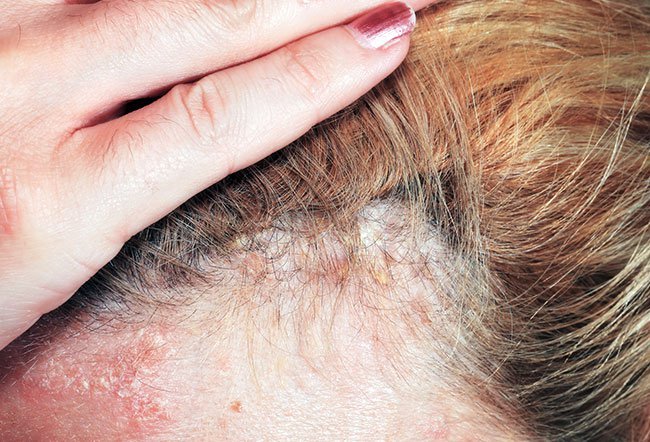What Triggers Psoriasis of the Scalp?

Scalp psoriasis is a skin disorder that stems from a dysfunctional immune system, which causes skin cells to grow too rapidly. When the body doesn’t get enough space to shed these extra skin cells, they accumulate on the skin surface, causing patches to appear.
Scalp psoriasis is not contagious. As with other types of psoriasis, the condition can run in your family. Most people with psoriasis have at least one family member who has also had this disease.
7 scalp psoriasis triggers
Triggers can vary from person to person. In general, however, avoiding these common triggers may help you prevent scalp psoriasis flare-ups.
1. Foods
While there’s no specific psoriasis diet, you may want to avoid the following:
- Nightshade plants, such as tomatoes, eggplants, and white potatoes
- Gluten (found in many grains and condiments)
- Foods made with white or refined flour
- Dairy products
- Shellfish
- Pork
- Red meat
- Sugary and fatty foods
2. Stress
Stress can exacerbate psoriasis, and vice versa, causing a vicious cycle. So it’s important to manage stress through yoga, meditation, or other relaxation techniques in order to prevent the aggravation of symptoms.
3. Alcohol
While research is limited, some studies have shown that alcohol can trigger flare-ups by causing inflammation in the body. So if you have scalp psoriasis, you should be careful about your alcohol intake.
4. Excess sun
Moderate sun exposure can help relieve psoriasis symptoms, but the key is moderation. Since sunburn can cause an outbreak, try to avoid being in the sun too much and make sure to protect yourself with sunscreen and a hat.
5. Cold, dry weather
When the air is cold and dry, it can strip moisture from your skin, which can worsen scaling and itching. Consider investing in a quality humidifier and minimizing time spent outdoors during the colder months.
6. Hormones
Low estrogen levels may trigger psoriasis in women, which may be why many see their symptoms worsen during puberty and menopause and improve during pregnancy. While there’s no way of knowing how your scalp will react to different stages in your life, talk to your doctor about your options.
7. Certain medications
Medications that can affect your autoimmune response include:
- Beta-blockers and angiotensin-converting enzyme (ACE) inhibitors, used for treating high blood pressure
- Antimalarial drugs
- Lithium
- Interferon-alpha used to treat hepatitis C
If your healthcare provider prescribes one of these medications, make sure to let them know that you have psoriasis.
